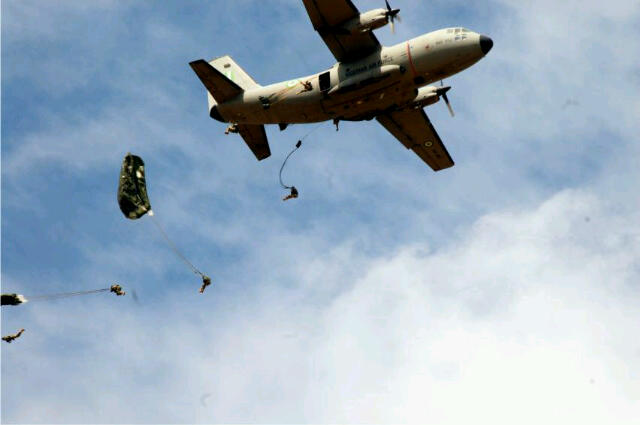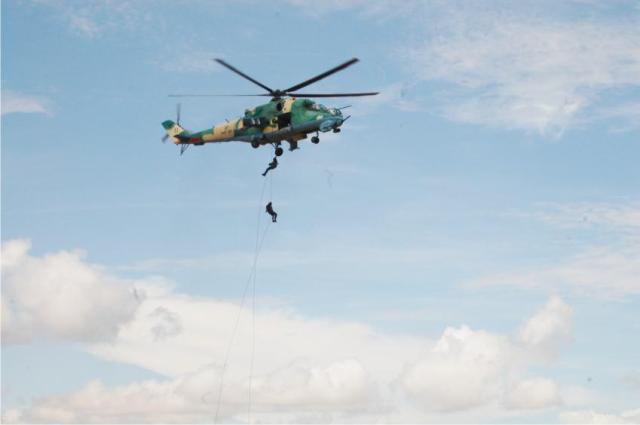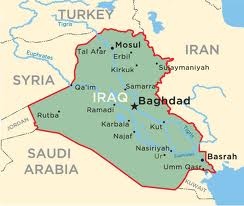RUSSEIFEH, Jordan -- From the edge of a steep mountain overlooking a desert compound built into an old rock quarry, machine gunfire echoes just outside hangars where U.S. special operations forces aretraining Jordanian commandos.
The Americans, who arrived in the kingdom a few weeks ago at the request of the Jordanians, are helping them develop techniques to protect civilians in case of a chemical attack from neighboring Syria, according to Jordanian officials.
On the Syrian border farther north, British military officers recently assessed the dangers of rockets constantly falling on the kingdom and ways to shield the Jordanian population and Syrian refugees as President Bashar Assad widens his military offensive against rebel enclaves in the vicinity, according to Jordan-based Western diplomats.
Jordan's King Abdullah II has repeatedly discussed plans for reinforcing security along the Syrian border and expressed concern over Syria's chemical stockpiles in meetings with visiting Western allies, according to the two diplomats, who monitor Syria from their base.
They said it is believed that Abdullah has also been shopping around for an anti-missile defense system to shield his densely populated capital, Amman -- home to nearly half of Jordan's population.
There is also talk of contingency plans for a quick pre-emptive strike if Assad loses control over his stock of chemical weapons in the civil war. The fear is that those weapons might otherwise fall into the hands of al-Qaida or Lebanon's Islamic militant group Hezbollah.
"There are dangers involved, and we have to ensure the safety of our country and the well-being of our citizens," a senior government official said in the first public Jordanian confirmation of the presence of foreign military personnel here. "We are benefiting from the experience of our allies as we prepare for the worst scenarios."
The presence of some 150 Americans at the King Abdullah II Special Operations Training Center northeast of the capital is a clear message to Assad that Jordan's longtime Western allies stand ready to defend the country if it is dragged into the 19-month Syria conflict.
Assad's regime, which is believed to have one of the world's largest chemical weapons programs, has said it might use them against external threats but not against Syrians.
But the Jordanians worry that Assad may use his chemical weapons against his neighbors, or his countrymen, if he felt that his days in power were numbered.
In May, the U.S. held joint exercises with Jordan, nicknamed the "Eager Lion," which focused on the ways to deal with a chemical weapons attack.
On Wednesday, U.S. Defense Secretary Leon Panetta said at a NATO conference of defense ministers in Brussels that the U.S. has been working with Jordan to monitor chemical and biological weapons sites in Syria and was helping Jordan deal with refugees pouring over the border.
Although the senior government official insisted that the Americans were "advisers, not troops," two senior U.S. defense officials said most were Army special operations forces. The U.S. officials spoke on condition of anonymity because they were not authorized to comment publicly about the mission.
The troops are operating out of a military center near Amman and have moved back and forth to the Syrian border. Their work involves gathering intelligence and planning joint Jordanian-U.S. military maneuvers, one U.S. official said.
The revelation of U.S. military personnel so close to the Syrian conflict suggests an escalation in theAmerican involvement, even as the Obama administration pushes back on any suggestion of a direct intervention in Syria.
The Jordanian official insisted that the kingdom was "capable of shielding itself from Syrian attack," but London-based Mideast analyst Rosemary Hollis disagreed.
"For Jordan, the more unstable Syria becomes, the deeper the crisis proceeds, the more likely Jordan will suffer from all kinds of spillover, but they are incapable of doing anything to intervene to try to turn the conflict in one direction rather than another unless they have the ballast, cover and involvement of serious international forces, which is the Americans," Hollis said.
She also saw the American military presence as a step toward possible future military operations to secure Syria's chemical stockpiles.
Torbjorn Soltvedt, a senior analyst with the Britain-based Maplecroft risk analysis group, said he saw the current situation as a "monitoring and training stage."
"Given the degree to which Syria's chemical weapons stockpiles have been dispersed across the country, an operation to secure them would be extensive and require significant numbers of troops," he said. "The Pentagon has estimated that an operation to secure Syria's chemical weapons stockpiles could require as much as 75,000 troops given the presence of several chemical agent manufacturing plants and many more storage sites throughout the country."
Panetta said that while the U.S. believes the weapons are still secure, intelligence suggests the regime might have moved some to protect them.
Steven Bucci, an expert in chemical weapons at the Heritage Foundation, has told Congress there might be as many as 50 chemical weapons sites in Syria. He said in an interview Wednesday that Syria's stockpile is potentially "like a gift from God" for militants since they don't have the know-how to assemble such weapons, while some of Syria's chemical agents are believed to have already been fitted into missile warheads.
At the desert facility, stretching 25 kilometers (16 miles) on the edge of this predominantly Palestinian suburb, Jordanian soldiers guard the walled compound, where Iraqi and Libyan special forces once received training. They refused to allow reporters in.
Jordanian officials were eager to downplay the U.S. role, concerned about the possibility of raising tensions with Syria and giving the kingdom's largely conservative population the impression that they were allowing foreigners to use Jordan as a potential launching pad for a pre-emptive attack against another Arab country.
The senior government official and two others who discussed the American military role all spoke on condition of anonymity, citing possible diplomatic sensitivities with Syria. Assad is thought to have sleeper cells scattered across the kingdom and plotting attacks on Syrian opposition and Jordanian figures.
Information Minister Sameeh Maaytah, the only official who spoke on the record, said the U.S. presence was part of "routine training exercises."
"Jordan and U.S. forces exchange visits regularly, and the presence of tens of their forces here is part of efforts to expand cooperation, exchange capabilities and protect regional stability," he said in an interview. He declined to elaborate or comment on any link to the Syrian crisis.
Amman has long had bumpy relations with Damascus because of its alliance with the United States -- Jordan's largest donor of economic and military aid -- and its 1994 peace treaty with Israel.
Jordan would like to see the Syrian regime toppled because of growing concern that Assad's key ally, Iran, is trying to spark Shiite uprisings in Arab countries ruled by members of the rival Sunni sect. Assad's ruling Alawite minority is an offshoot of Shiite Islam.
Abdullah was the first Arab leader to warn in 2004 of the sweep of Iran's "Shiite crescent," stretching from Lebanon through Syria and Iraq.
Jordanian officials have advocated a buffer zone inside the Syrian border to protect civilians fleeing bombardment. There is mounting speculation that Jordan would dispatch highly skilled special forces to secure such a zone when Assad's regime falls to prevent chaos on its border.
In the past six weeks, more than 20 Syrian rockets have fallen on Jordanian villages near the border. At least two people were wounded, including a 4-year-old Jordanian girl.
The two Western diplomats said the Britons, about a half-dozen officers specialized in intelligence gathering and special operations techniques, visited Jordan a few times over the past three months. The diplomats insisted on anonymity, saying that public comment may hamper their information gathering on Syria.
The Jordanian army already has an extensive presence on the border and has been assisting waves of Syrian refugees, who are straining the country's meager resources, mainly health care, water and utilities.
Jordan hosts some 200,000 Syrian refugees, more than any other neighboring country. Some come under constant firing from their army as they cross into the kingdom. Jordanian border guards have been wounded and a 6-year-old Syrian boy was killed in July.
Jordanian men also are moving the other way across the border, joining what intelligence officials have estimated to be about 2,000 foreigners fighting alongside Syrian rebels trying to topple Assad



